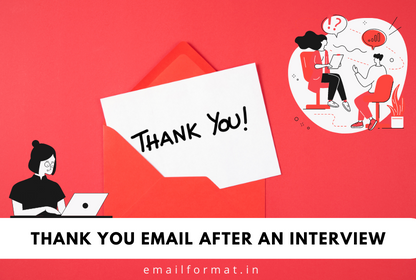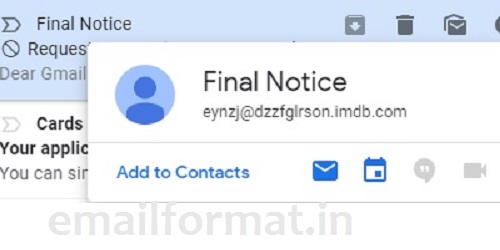How To Write a Thank You Email After an Interview?
Are you thinking when is the best time to send a thank you note after an interview? Four hours is the short answer. One day rule is frequently mentioned, but it makes no sense to put this off for so long. At the same time, you don't want to come across as pushy or desperate – sounds like a first date, doesn't it?
The causes for sending a thank you email after an interview are threefold: first, to demonstrate courtesy and good manners; second, to leave one last reminder of why you are qualified for the job; and third, to express your continued interest.
Nothing to worry; this interview thank you note should be brief. Here is an example of a thank you email after an interview mentioned below.
Example of Thank You Email After an Interview
Dear Mrs. Nisha,
Thank you for meeting with me earlier today and discussing the role of [Java Developer]. I enjoyed learning more about the position and its responsibilities.
Although I mentioned during our conversation, I believe that my [Java skills/experience in Springboot] would be especially useful in contributing to your project.
If there is anything else I can do to assist you in making your decision, please let me know. I look forward to hearing from you.
Yours Sincerely,
[Your name]
This type of note presumes that you are genuinely interested in the position. Often an interview will make you realise that a job is not for you. If this is the case, and you are certain that you will decline a job offer, use the interview thank you email to polite way express your disinterest in the position.
When and How to Write Thank You Email After An Interview?
"What is the next step in your hiring process?" is one of the questions you should ask during a job interview. This gives you an idea of when you can expect to hear from the organization.
It is critical to respect the job-hiring process that recruiters follow. Except for a thank you note, if the person who interviewed you said a decision would be made by next Wednesday, don't contact them before then.
You may be very interested in the position and wish to persuade the company that you are the best candidate for it. But don't do it. It increases the likelihood that a recruiter will perceive you as a bad listener or disrespectful of other people's time.
However, suppose the hiring manager said you'd hear back by Tuesday, and it's now Tuesday evening. In that case, it's time to take action. There is no harm in sending a brief interview follow-up note to see if the company has made a decision.
Example of What Should an Interview Thank You Email Say
Dear Mr. Tarun,
I hope everything is well with you. I'm just checking in to see if you've made a decision on the DBA position. If not, could you please inform me when a decision will be made?
Thank you very much, and please advise if you require any additional information about my qualifications.
Yours Sincerely,
[Your name]
You should receive a response within a day of sending this email. If you don't receive one, your best bet is to call the recruiter and inquire about where the organization is in the decision-making process.
What Should You Do If You're Invited to a Second Interview?
You may be asked to return for a second interview depending on the organization you are interviewing with. This is common in larger companies with more complex recruiting systems. However, small businesses will conduct multiple interviews to ensure you are a good fit for their team.
If you receive a phone call or email inviting you to a second interview, you should gather as much information as possible about who you'll be speaking with and how it may differ from the first.
For example, you should ask questions like:
- Will I see the same team members as the other day?
- Is there anything specific I should be prepared to talk about?
- Should I anticipate being tested on any specific skills?
- What is the most challenging part of this job?
- What is the team size of this department, and what is its organisational structure?
It is appropriate and reasonable to ask questions about salary, culture, and opportunities available to employees during a second interview. You can also inquire about day-to-day work and company objectives. Create a checklist of all of this information and then prepare accordingly.
What Should You Do If You Are Rejected for a Job?
You will not always be able to get the job you want. It is difficult to perfectly fit into the needs of an organization. So, if you're contacted after a job interview and told you didn't get the job, don't take it personally. Instead, view this as a learning experience.
When a hiring manager contacts you with bad news, thank him/her again for the consideration while also asking a few questions. First, explain that you want to improve your interviewing skills and ask for suggestions on how to do so in the future. Second, inquire as to whether you possess any skills and experience that would make you a more attractive candidate.
You may or may not receive specific feedback, but you may learn something useful for future interviews.
Keep going on, and give yourself a pat on the back for putting yourself out there.
What to Do If You Are Given a Job Offer?
The hiring manager goes through a difficult process before deciding to offer you a job, but you also have a lot to think about.
You should be aware that when you are offered a job, whether by phone or email, a negotiation process begins. One of the fundamentals of negotiation is that you never want to be caught off guard because it can lead to an irrational decision. As a result, when you hear that a company wants to hire you, follow this procedure:
For example, you should ask questions like:
- Allow the hiring manager to do the talking – Have him/her share as much information about salary, benefits, starting date, and so on as possible.
- Ask clarifying questions – If you are unsure about anything, try to get some clarification.
- Don't act too quickly – The excitement of being offered a job may cause you to accept it right away. However, hiring managers rarely expect a decision right away. As a result, inquire when they require you to make a decision. You'll probably have a day or two to think about it. However, if the hiring manager requires your decision right away, try to negotiate at least a couple of hours.
Afterwards, the importance of all of the post-interview steps discussed above cannot be overstated. And, to be honest, each of these steps is far less time-consuming than creating your resume, writing your cover letter, and preparing for an interview. So remain focused and see the process through to completion.
Keep going on, and give yourself a pat on the back for putting yourself out there.
Thank You Email After an Interview - More Samples
Let's look at some more thank you email after an interview samples.
Thank You Email After an Interview - Sample 1
Dear Mr. Tanmay,
Thank you for your time today. It was extremely helpful, and I now know a lot more about the job and your organization.
I've been interested in this job role since I saw it advertised, and today's interview confirmed that.
I'm hoping to hear from you soon.
Thanks,
[Your name]
Thank You Email After an Interview - Sample 2
Dear Mr. Tanmay,
I wanted to thank you again for your time today on the phone. Following our conversation, I am confident that I would be a good fit for your company and would like to express my continued interest in this position. I could see myself waking up every day eager to take on this challenge and believing that I could be a valuable member of the team.
Please do not hesitate to contact me if you have any further queries. I'm hoping to hear from you soon.
Thank you again, and have a wonderful day!
Thanks,
[Your name]
Viewers visiting this page are also referring to
Email Writing Format: Guidelines and Samples
Show Appreciation for the Opportunity
Begin your thank you email by expressing genuine gratitude for the interview opportunity. Mention the interviewer’s name, the specific role, and how much you appreciated the chance to learn more about the position and the company culture. A warm tone leaves a positive and lasting impression.
Highlight a Key Takeaway
Mention a specific moment or insight from the interview that stood out to you. This shows active listening and reflects your enthusiasm. Whether it was a company value or a project discussion, connecting to the conversation personalizes your follow-up and reinforces your fit for the role.
Reiterate Your Interest in the Role
Close your email by briefly reiterating your excitement about the role and how your skills align with the team’s goals. This reconfirms your interest and keeps you top-of-mind. A short, confident restatement of your enthusiasm can help strengthen your candidacy in the decision-making process.
Finally, Should You Send Thank You Email After an Interview?
Yes, I'd send it within a few hours after an interview. Here's why it's a smart move.
- Because not everyone will do this, it is a simple way to distinguish yourself from other candidates interviewing for the same position.
- It allows you to demonstrate your ability to follow up.
- Sending it within a couple of hours demonstrates urgency.
- It confirms your level of interest in the position. It can be difficult for the interviewer to tell whether you're just kicking the tyres or if this is THE position you want.
- It's a chance to keep the interviewer interested after the initial call.
People also looked at subject line for resignation email, and our real resignation letter email samples.




